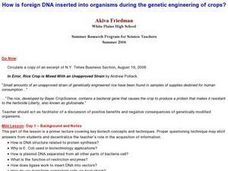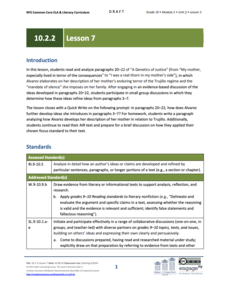American Museum of Natural History
Differentiate! The Stem Cell Card Game
Let the games grow. Groups play a card game to grow cells. Players start growing cells from stem cells to create specialized cells in the human body. Learners use full-grown cells from the human body to create stem cells in the lab to...
Serendip
Cell Differentiation and Epigenetics
Pregnant women exposed to PAH air pollution increase the risk of obesity in their children. The example of epigenetics, along with others, builds the basis for understanding the process of cell differentiation. Scholars view a video,...
Serendip
Learning about Genetic Disorders
Each genetic disorder has its own story to tell. A research-based lesson asks individuals to investigate a genetic disorder using scientific web resources. Guiding questions ask them to explain the mode of inheritance and the effects of...
Curated OER
Genetic Mind Reader Review Game
Students review some important concepts and terms relevant to the Human Genome Project and genetic research. The game is played like a mind reading session between two teams.
Virginia Department of Education
Mendelian Genetics
How did Mendel know which pea plants would demonstrate certain characteristics? Pupils explore the answer this question, among others, as they complete Punnet squares, research dominant and recessive traits, and explore hereditary...
Curated OER
Pregnancy, Day 3: Prenatal Health
Focusing on prenatal health, this thorough resource provides discussion points about behaviors of the mother and of the father. It differentiates between controllable behaviors that help decrease problems with the developing fetus, and...
Curated OER
Genetic Vocabulary Review
In this genetics vocabulary worksheet, students answer 13 multiple choice questions about the structure and function of genes.
Intel
Designer Genes: One Size Fits All?
In this STEM group of 10 activities, lesson two focuses on the question, "Just because we can, should we?" when considering genetically engineered food. Classes hear a scenario and, as young scientists and geneticists, must determine if...
Curated OER
Dragon Genetics Lab-Principles of Mendelian Genetics
Students study genetic traits using popsicle sticks as chromosomes. In this biology lesson, students explain how traits are inherited from parents. They differentiate dominant and recessive genes.
Curated OER
Genetics - Critical Thinking
For this genetics worksheet, students review terms and processes associated with genetics. This worksheet has 2 multiple choice and 21 matching questions.
Howard Hughes Medical Institute
Microarrays and Stem Cells
Background reading is available in the first two pages of this worksheet, along with reading comprehension questions and a laboratory activity in which students use mircroarray technology to identify genes used in cell differentiation....
Beyond Benign
Kitten Creation
Your pupils become geneticists as they create cat offspring. The next lesson in a series continues an exploration of genetic makeup as scholars consider parent traits to build their offspring. Using household items, they create kittens...
Curated OER
Gene Expression DNA to RNA to Protein to Trait
There are six boxes on this genetics worksheet. In one, learners draw and label the DNA molecule. In another, they compare pre-mRNA to mRNA. Other boxes require definitions, labeling, and explaining relationships.
Curated OER
All in the Family
Students develop family genealogy charts in search of noticeable genetic relationships between relatives. They research their family and write a reflection on the genetic relationships between individuals on the chart.
Curated OER
Parental Genes
Eighth graders explore how different organisms pass their traits to their offspring. In this life science lesson plan, 8th graders differentiate recessive and dominant alleles. They predict the phenotype based on the genotype of an...
Curated OER
Regents High School Examination: Living Environment 2009
Emerging ecologists need a full understanding of life, from the inner workings of a cell to the complex relationships among organisms. This examination is meant to assess high schoolers after an entire year course on the living...
Curated OER
Regents High School Examination: Living Environment 2007
Environmental science enthusiasts show what they know at the end of the year by taking this full-fledged final exam. They answer multiple choice, graph interpretation, and essay analysys questions, 73 of them in all. Topics range from...
Curated OER
Punnett Squares/Genetics
Ninth graders complete a monohybrid cross and a dihybrid cross. In this biology lesson, 9th graders predict the traits of offspring using the Punnett square. They differentiate recessive and dominant genes.
Curated OER
How is Foreign DNA Inserted into Organisms During the Genetic Engineering of Crops?
Students examine the positive benefits and negative consequences of genetically modified organisms following a lecture covering key biotech concepts and techniques. Students then conduct and experiment comparing the travel rate of...
Curated OER
Island Biogeography and Evolution
Students develop likely phylogenies for seven related populations of lizards living on the Canary Islands using real data. They organize charts, and record the data for geography, geology, morphology, and molecular genetics.
EngageNY
Grade 10 ELA Module 2: Unit 2, Lesson 4
What does it mean to come undone? Scholars consider the author's use of the phrase as they read paragraphs 12–15 from Julia Alvarez's autobiographical essay "A Genetics of Justice." They complete a quick write to analyze how Alvarez...
EngageNY
Grade 10 ELA Module 2: Unit 2, Lesson 3
Does trauma have a lasting effect on people's lives? Scholars dive into the topic as they read paragraphs 9–11 of "A Genetics of Justice" by Julia Alvarez, in which the author describes her family's return to the Dominican Republic....
EngageNY
Grade 10 ELA Module 2: Unit 2, Lesson 6
How do authors use rhetorical devices and word choice to emphasize their ideas? Pupils consider the question while reading paragraphs 16–19 from Julia Alvarez's essay "A Genetics of Justice." Readers engage in evidence-based discussion...
EngageNY
Grade 10 ELA Module 2: Unit 2, Lesson 7
"No flies fly into a closed mouth." Pupils consider the proverb's meaning as they read paragraphs 20–22 from the essay "A Genetics of Justice" by Julia Alvarez. They also engage in small-group discussions about how the author refines her...

























